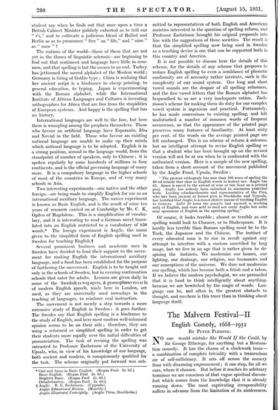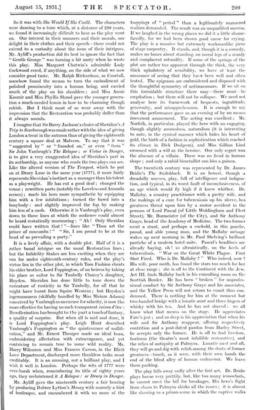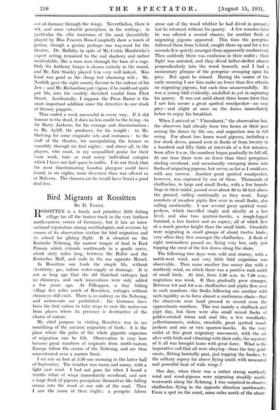The Malvern Festival—II
English Comedy, 1668-1931
BY PETER FLEMING.
NO one would mistake She Would If She Could, by Sir George Etherege, for anything but a Restora- tion comedy. It has the charm of a clockwork train— a combination of complete triviality with a tremendous air of self-sufficiency. It sets off across the nursery floor with disarming empressement ; it can stop, for all we care, where it chooses. But before it reaches its arbitrary terminus we are conscious of that vague spiritual discom- fort which comes from the knowledge that it is already running down. The most captivating irresponsibility suffers in advance from the limitation of its aimlessness, So it was with She Would If She Could. The characters were dancing to a tune which, at a distance of 250 years, we found it increasingly difficult to hear as the play went on. Our interest in their manners and their morals, our delight in their clothes and their speech—these could not extend to a curiosity about the issue of their intrigues. Mr. Ayliff's production did its best to ignore the fact that "Gentle George" was turning a bit nasty when he wrote this play. Miss Margaret Chatwin's admirable Lady Cockwood erred, if anything, on the side of what we now consider good taste. Mr. Ralph Richardson, as Courtall, somehow found the means to turn the embodiment of polished promiscuity into a human being, and carried much of the play on his shoulders ; and Miss Annie Kasmir and Miss Phyllis Shand gave the younger genera- tion a much-needed lesson in how to be charming though rakish. But I think most of us went away with the impression that the Restoration was probably duller than it always sounds.
I imagine that Sir Barry Jackson's choice of Sheridan's A Trip to Scarborough was made rather with the idea of giving London a treat in the autumn than of giving the eighteenth century a square deal at Malvern. To say that it was "suggested by" or "founded on," or even " from " Sir John Vanbrugh's The Relapse ; or Virtue in Danger, is to give a very exaggerated idea of Sheridan's part in its authorship, as anyone who reads the two plays can see. Like the altered version of The Tempest, which he put on at Drury Lane in the same year (1777), it more fairly represents Sheridan's instinct as a manager than his talent as a playwright. He has cut a good deal ; changed the venue ; rewritten parts (notably the Loveless and Amanda scenes) ; made his hero more sympathetic by equipping him with a few inhibitions ; turned the bawd into a busybody : and slightly improved the fop by making him less of a snob. Otherwise it is Vanbrugh's play, even down to those lines at which the audience could almost be heard ecstatically murmuring : " Ah ! Only Sheridan could have written that ! "—lines like "Thou art the prince of coxcombs ! " "Sir, I am proud to be at the head of so prevailing a party."
It is a lively affair, with a double plot. Half of it is a rather banal intrigue on the usual Restoration lines ; but the Infidelity Stakes are less exciting when they are run for under eighteenth-century rules, and the play's virtue lies in the other plot, in which Tom Fashion cheats his elder brother, Lord Foppington, of an heiress by taking his place as suitor to Sir Tunbelly Clumsy's daughter, Hoyden. Sheridan has done little to tone down the caricature of rusticity in Sir Tunbelly, for all that he might have learnt from Squire Western ; but Hoyden's ingenuousness (skilfully handled by Miss Miriam Adams) conceived by Vanbrugh as an excuse for salacity, is now the more effective for having no such transparent raison d'etre : Bowdlerization has brought to the part a touch of fantasy, a quality of surprise. But when all is said and done, it is Lord Foppington's play. Leigh Hunt described Vanbrugh's Foppington as "the quintessence of nullifi- cation," and Mr. Ernest Thesiger made an ideal beau, embroidering affectation with extravagance, and yet contriving to remain true to some wild reality. Mr. Harry Wilcoxon and Miss Frances Carson, in the Illicit Love Department, discharged more thankless tasks most creditably. It is an amusing, not a brilliant play, and I wish it well in London. Perhaps the wits of 1777 were over-harsh when, remembering its title of eighty years ago, they rechristened it A Relapse : or Drury in Danger.
Mr. Ayliff gave the nineteenth century a fair hearing by producing Bulwer Lytton's Money with scarcely a hint Of burlesque, and encumbered it with no more of the trappings of " period " than a legitimately mannered realism demanded. The result was an unqualified success. If we laughed in the wrong places we did it a little shame- facedly, for we had been shown good cause for crying. The play is a massive but extremely workmanlike piece of stage carpentry. It stands, and, though it is a comedy, makes no bones about standing, on moral legs of a sturdy and complacent rotundity. If some of the springs of the plot are rather too apparent through the thick, the very thick upholstery of sensibility, we have at least the assurance of seeing that they have been well and often tested. The epigrams are embroidered and disposed with the thoughtful symmetry of antimacassars. If we sit on this formidable. structure there may—there must—be crepitation ; but there will not be collapse. We need not analyse here its framework of bequests, ingratitude, generosity, and misapprehension. It is enough to say that the performance gave us an evening of by no means irreverent amusement. The acting was excellent ; Mr. Norfolk, in particular, played the hero with an engaging, though slightly anomalous, naturalism (it is interesting to note, in the cynical manner which hides his heart of gold, the birth of a fashion in sophistication which reached its climax in Dick Dudgeon), and Miss Gillian Lind swooned with a will as the heroine. Our only regret was the absence of a villain. There was no fiend in human shape ; and only a rabid bimetallist can hiss a guinea.
The twentieth century was represented by Dr. James Bridie's The Switchback. It is an honest, though a dreadully uneven, play, full of intelligence and indigna- tion, and typical, in its worst fault of inconclusiveness, of an age which would fly high if it knew whither. Dr. Mallaby, a country practitioner with a pretty wife, and the makings of a cure for tuberculosis up his sleeve, has greatness thrust upon him by a motor accident in the persons of Lord Pascal (of Little Woldingham and Fleet Street), Mr. Burmeister (of the City), and Sir Anthony Graye, head of the Academy of Medicine. The two former scent a stunt, and perhaps a cuckold, in this gauche, proud, and able young man, and the Mallaby m6nage wakes up next morning in Mr. Paul Shelving's brilliant pastiche of a modern hotel suite. Pascal's headlines are already baying, oh ! so altruistically, on the heels of tuberculosis. "War on the Great White Plague. First Shot Fired. Who is Dr. Mallaby ? " Who indeed, now ? His wife, poor moth, has found the stars too much for her at close range ; she is off to the Continent with the Jew. Act III. finds Mallaby back in his consulting room on the Scottish Border. He has been " broken " for unprofes- sional conduct by Sir Anthony Graye and his associates, and the Yellow Press will not return to vomit thus con- demned. There is nothing for him at the moment but two-handed bridge with a lunatic aunt and three fingers of whisky with his tea. And he has not shaved : we all know what that means on the stage. He appreciates Fate's jest ; and so deep is his appreciation that when his wife and Sir Anthony reappear, offering respectively contrition and a post-dated pardon from Harley Street, he accepts only the former. He is off to find freedom, horizons (the theatre's most infallible restorative), and the relics of antiquity at Palmyra. Lunatic aunt and all, they will go and dig with relish among the dusts of former greatness—touch, as it were, with their own hands the end of the blind alley of human endeavour. We leave them packing.
The play falls away sadly after the first Eta. Dr. Bridie plays havoc very prettily, but, like too many iconoclasts, he cannot meet the bill for breakages. His hero's flight from chaos to Palmyra shirks all the issues ; it is almost like showing us a prison-scene in which the captive walks out of durance through the wings. Nevertheless, there is wit, and some valuable perception, in the writing ; in particular the elfin tantrums of the aunt (beautifully played by Miss Frances Ross-Campbell) show a touch of genius, though a genius perhaps too wayward for the theatre. Dr. Mallaby, in spite of Mr. Cedric Hardwicke's expert acting, remained to the end shadowy and rather incalculable, like a man seen through the bars of a cage. Only Sir Anthony Graye is shown entirely in the round, and Mr. Eric Stanley played Ein very well indeed. Miss Lind was good as the cheap but charming wife ; Mr. Norfolk gave the right county flavour to the culture of his Jew ; and Mr. Richardson put vigour, if he could not quite put life, into the crudely sketched vandal from Fleet Street. Incidentally, I suppose the Press Baron is the most important addition since the detective to our stock of literary puppets.
Thus ended a week successful in every way. If it did honour to the dead, it does no less credit to the living—to Sir Barry Jackson, for his courage and discrimination : to Mr. Ayliff, the producer, for his insight : to Mr. Shelving for some exquisite sets and costumes : to the staff of the theatre, for manipulating the former so smoothly through six first nights : and above all, to the players, who must, in my unqualified praise for their team work, take as read many individual eulogies which I have not had space to indite. I do not think that the most discriminating London playgoer could have. found, in six nights, more diversion than was offered us at Malvern. The chances are he would have found a good deal less.
































 Previous page
Previous page